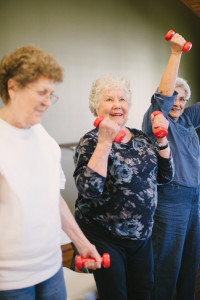 One in three Americans over age 65 — more than 700,000 in all — fall every year, making falls the leading cause of injuries, deaths, hospitalizations and emergency room visits for older Americans (National Safety Council). Falls are the leading cause of both fatal and nonfatal injuries for people 65 years or older. While accidents do happen, there are steps that can be taken to prevent such injuries.
One in three Americans over age 65 — more than 700,000 in all — fall every year, making falls the leading cause of injuries, deaths, hospitalizations and emergency room visits for older Americans (National Safety Council). Falls are the leading cause of both fatal and nonfatal injuries for people 65 years or older. While accidents do happen, there are steps that can be taken to prevent such injuries.
There are common factors that can contribute to falls as we age. Our balance and gait changes as we age, but if we become inactive, our chances of falling will increase. The old saying, “use it or lose it,” is not a myth. Changes in our vision may also be a contributor to falls. Whether we develop cataracts, decreased vision, or even macular degeneration, any change of our vision may cause us to trip. We need to also remember that some medications can cause us to become light headed or dizzy, especially when standing up too quickly. We also should be careful with everything in our environment – from the types of shoes we wear to the carpet we walk on. High heels along with loose fitting shoes can cause someone to fall. Also, small pieces of carpet or rugs that can move easily or shift may increase your chances for a fall risk.
So what can one do to decrease your chances of falling? Start with something as simple as walking through your loved ones’ home. Look for potential items that may be placed too close to the walkway that could possibly cause a fall. This would be especially true if your loved one has a rolling walker or a cane when ambulating. How is the lighting of the walkways in their house? Maybe a night light would help aid in fall prevention. If you have stairs in your house, make sure there are two rails to use for security. If needed, add grab bars in your bathroom near your toilet or in the shower for safety. For even greater safety, use a shower chair along with a hand held shower.
Medications could also be a factor in having balance issues. Blood pressure pills, muscle relaxants, diuretics and other medications could increase the risk of falls due to dizziness, confusion and drowsiness. It would be beneficial to talk to your doctor about any possible side effects your medications could have. You should also discuss ways to promote bone health.
Those who stay active lower their risk of falls exponentially. With your doctor’s OK, exercises such as walking, water aerobics and chair yoga are gentle techniques for keeping your body strong.
Article written by Timmy Kleine, RN, Heckman Assisted Living Manager






Leave a Reply